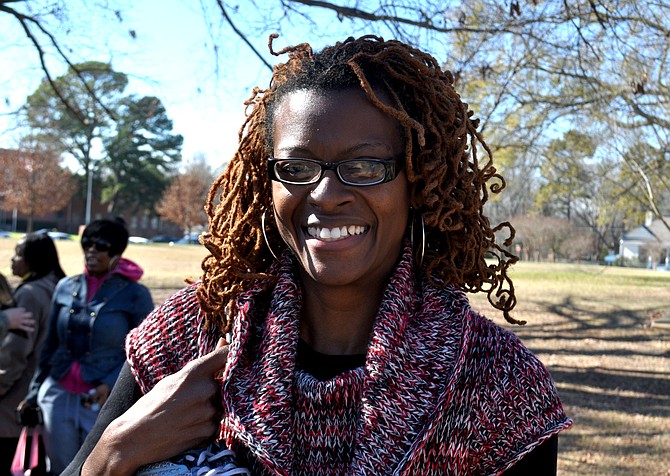Cassandra Welchlin, an analyst for the Mississippi Low-Income Child Care Initiative, is concerned about what will happen to families receiving Temporary Assistance for Needy Families if a beneficiary tests positive in a drug test that state law now mandates. Photo by Trip Burns.
One in 40—that's the likelihood that a person participating in the Temporary Assistance for Needy Programs, a monthly subsidy program for poor and working-class families, in Mississippi is a drug user.
In August, the state officially rolled out a law the Legislature passed earlier this year that required random drug screening of people applying for TANF benefits.
Since then, more than 3,600 people who have applied to the program. Of that, a screening test found about 80 people at risk for possible drug use, which led to two positive drug tests.
HB 49 legislation requires anyone caught with drugs in their system while receiving monthly cash benefits to submit to an approved drug-rehabilitation program.
During that time, the benefits going to that family are transferred to a conservator until treatment is complete. If the beneficiary refuses treatment, the family is stripped of assistance, which the U.S. Department of Health and Human Services provides and the state administers. A previous version of the law would have stripped families of the assistance.
It's the lack of clarity about what is supposed to come next that has prompted concern among civil-liberties and family advocates. Charles Irvin, the legal director for the American Civil Liberties Union of Mississippi, which helped make some amendments to the legislation, points out that the law, House Bill 49, fails to specify who is responsible for paying for drug treatment. The ACLU's research determined that the average cost of a rehab program in the Jackson area is approximately $16,000.
"The state is saying Medicaid is going to pay, and Medicaid has not backed that up," Irvin said.
David Noble, state operations director for field operations at the Mississippi Department of Human Services, which administers TANF and several other programs for low-income families, explains that most TANF recipients are eligible for Medicaid, the joint state-federal health-care program for poor people. Mental-health and drug-abuse treatment is reimbursable, according to federal Medicaid guidelines.
Even if Medicaid covers the treatment, the cost of the treatment can still vary widely. For example, at Hinds Behavioral Comprehensive Health Center, costs depend on the nature of the treatment and what type of insurance the patient has, said Marva Clark, the center's director of substance abuse services.
Clark said a physician must evaluate individuals seeking treatment to determine the treatment that will work best, which could be individual or group therapy or outpatient care at a specialized facility for the most severe cases. Outpatient care is significantly more costly, and Clark said some rehab centers do not accept Medicaid.
Irvin of the ACLU, which has sued in some states that passed laws requiring everyone applying for TANF to be tested, is concerned about the apparent lack of communication between the state Division of Medicaid and DHS. Those agencies are the main two state offices involved in enforcing the drug-testing requirement.
When asked if Medicaid would cover the cost of substance-abuse treatment, Medicaid spokesman Matt Westerfield said, "As written, House Bill 49 does not specify Medicaid involvement in the drug testing for Temporary Assistance for Needy Families (TANF) program. .. If an individual is on the TANF program, it does not necessarily mean they are also eligible for, or receiving Medicaid benefits."
Noble, of MDHS, said the agency will deal with any payment issues that arise on a one-on-one basis. Irvin said the ACLU is monitoring the implementation of the program in Mississippi. In Florida, which passed a similar law, the ACLU challenged the constitutionality of the law and has won two federal court victories. Most recently, the 11th U.S. Circuit Court of Appeals upheld a lower federal court's ruling that the Florida drug testing law, passed in 2011 under a cloud of controversy, violates the Constitution.
"The state has not demonstrated a more prevalent, unique or different drug problem among TANF applicants than in the general population," a three-judge panel wrote in its unanimous decision in the Florida case, handed down Dec. 3.
Several Mississippi organizations are closely monitoring the law, including the ACLU and the Mississippi Low-Income Childcare Initiative. Cassandra Welchlin, a policy analyst with the initiative, said her organization is also concerned about what will happen to TANF families, whose heads of household typically work low-wage jobs and could be affected by the drug-testing policy.
One of the main concerns is whether TANF recipients forced into drug treatment can then keep their jobs. And, like the ACLU, Welchlin said she is worried how the treatment will be paid for and what happens if Medicaid doesn't pay as MDHS claims.
"What we're clear on is that this cost can't be passed along to families," she said.



Comments
Use the comment form below to begin a discussion about this content.